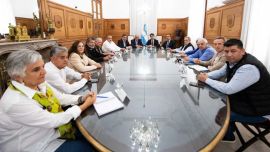The calm words and occasional smiles of Economy Minister Martín Guzmán on Wednesday, in his official presentation before a public that has hardly ever heard of him before, did not match with the content of his message. Argentina, he said, after barely 24 hours into the job, is in a state of emergency and it will take some time for the country to recover.
The news is that this is no news at all. Argentina was officially declared in an emergency after the 2001 debt default, via congressional legislation that gave the Executive special authority to modify the budget, allocate resources freely and change taxes without undertaking the legislative paperwork in the middle. The law was systematically renewed by Congress, year after year, even in those years (like 2010 and 2011) when Argentina was growing at almost double-digit rates. That was until December 2017 when – after winning the midterm elections and the only year of his administration when the economy actually grew – then-president Mauricio Macri decided it was not needed anymore.
And then it was needed again: starting in April 2018, the country faced yet another major emergency, when a run on the peso that continues to this day started.
Guzmán, fresh off the plane after more than a decade of academic work in the United States, sought to show cool and temperance, hoping to deliver the message that the country needs to “be taken care of” and that the economy will “calm down.” But in the meantime, while the heat is still on, the administration will keep in place the tight foreign exchange controls introduced by Macri in a desperate effort to financially survive the presidential transition.
The question Guzmán cannot fully answer is how cool will Argentina’s creditors be when the new administration summons them to the debt negotiating table. The minister claimed that the International Monetary Fund (IMF), for instance, has “acknowledged that that programme with the country failed.” Guzmán reportedly held a meeting with the Fund’s Managing Director Kristalina Georgieva shortly before boarding a plane to take his government position.
But the IMF has not been so explicit about its evaluation of the stand-by agreement it signed in 2018 with the Macri administration. In public, Georgieva delivered only a customary platitude to salute President Alberto Fernández’s inauguration: “We fully share your objectives of pursuing policies that reduce poverty and foster sustainable growth. The IMF remains committed to assisting your government in this endeavour.” And the IMF’s spokesman, Gerry Rice, said on Thursday that the IMF was going to “wait and hear” Argentina’s new programme in detail before jumping to any conclusions.
Congress will meet in a hurry next week to declare the country in an economic, food and health emergency (it’s back again). In his drive to convey a lull, Guzmán said one piece of legislation will not be titled emergency but rather a “solidarity and productive revitalisation.”
Beyond the grand titles, the political and business establishment seems to be moving – again – toward placing all the burden of recovery on the shoulders of one person, in this case the president and a handful of people in his newly appointed team. Fernández has said that no leader can do this on his own, and he is right. But by asking Congress to vote on a declaration of an emergency and give him special magic powers, he might be painting himself into a corner of loneliness.
Maybe against his will, Guzmán might become the symbol of that. His somewhat unexpected appointment at the helm of the hot-potato ministry strikes a delicate balance between the economic views of the president and those of the vice-president, Cristina Fernández de Kirchner. Asked to choose without conditions, Fernández would have likely picked someone with more market seniority for the job. Asked to choose without conditions, Fernández de Kirchner might have chosen someone with even less market appeal, even one that might have scared the markets away a bit.
On the bright side, Guzmán stands on an unstable patch of
middle ground, having political status or strong local affiliation
of his own, while belonging to a certain mainstream aspect
global liberalism that gives him an aura of sophistication that
might come in handy down the road. For the same reasons, but
on the darker side (at least for him), his eventual initial failure
would not become a direct political cost for either Fernández
or Fernández de Kirchner – it would simply be equally distributed between the two. related news





















Comments